Best ai chatbot
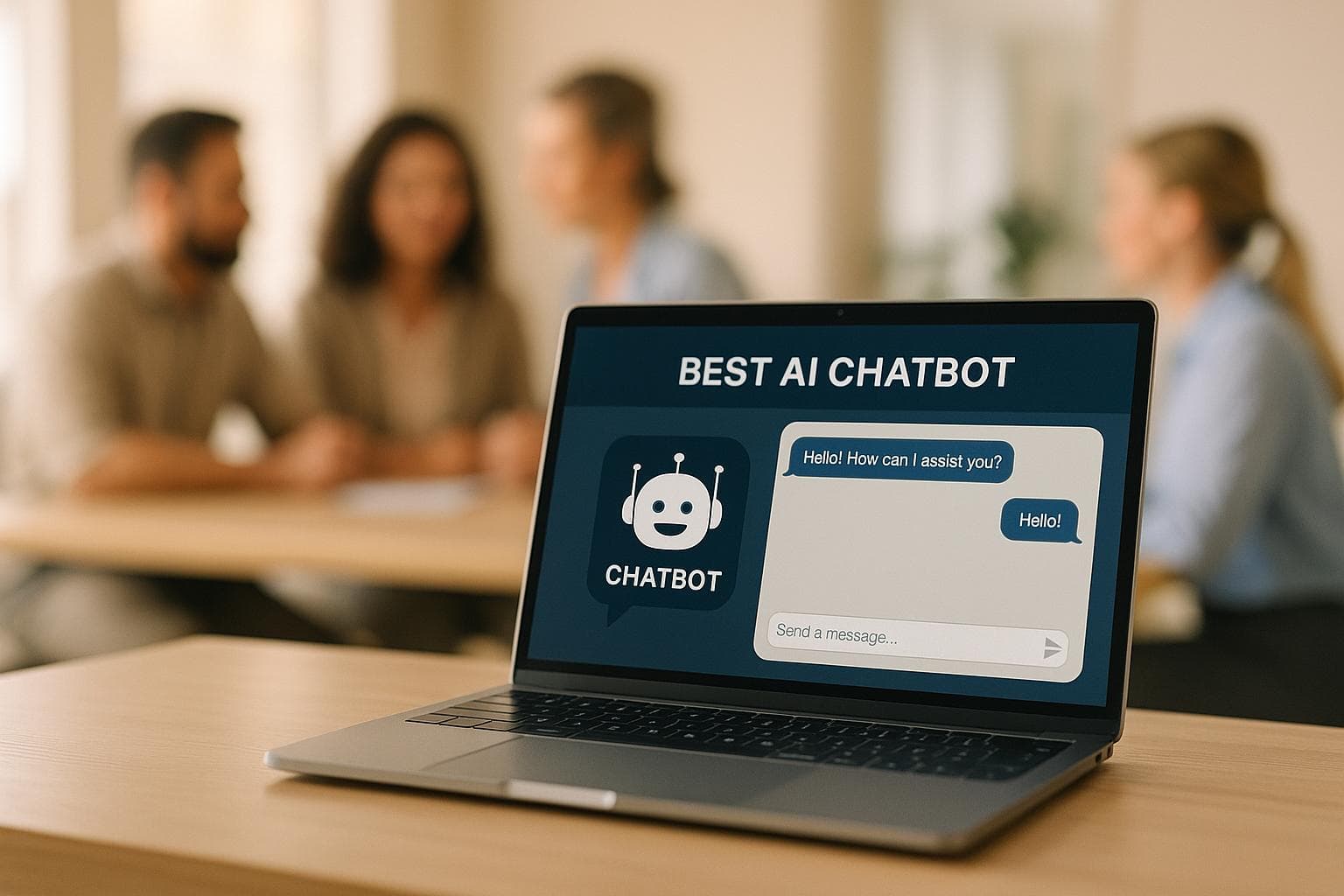
Best ai chatbot
AI chatbots are transforming customer service for businesses in the U.S., offering faster responses, cost savings, and better customer satisfaction. By 2025, 80% of companies are expected to use AI chatbots, with many reporting productivity gains of 30–50%. This guide reviews five top chatbot platforms, comparing features, pricing, and use cases to help you choose the right one for your needs.
Key Highlights:
- OpenAssistantGPT: No-code platform with flexible pricing, starting at $0/month.
- ChatGPT by OpenAI: Advanced conversational AI, starting at $20/month.
- Microsoft Azure Bot Service: Enterprise-grade solution for $5/month.
- Tidio AI Chatbot: E-commerce focused, starting at $25/month.
- ManyChat: Social media automation, starting at $15/month.
Quick Comparison:
| Platform | Starting Price | Key Features | Best For |
|---|---|---|---|
| OpenAssistantGPT | $0/month | No-code setup, integrations, GPT models | Website customer support |
| ChatGPT | $20/month | Advanced AI, GPT-4.5, custom tools | General-purpose use |
| Azure Bot Service | $5/month | Microsoft ecosystem, multi-channel support | Enterprise users |
| Tidio AI Chatbot | $25/month | E-commerce tools, sales automation | Online retailers |
| ManyChat | $15/month | Social media messaging, high engagement rates | Messenger marketing |
AI chatbots save businesses time and money, improve customer experiences, and scale easily across industries. Read on to explore their features and pricing in detail.
Best AI Chatbots in 2025 (Ranked by Best Use Cases)
1. OpenAssistantGPT
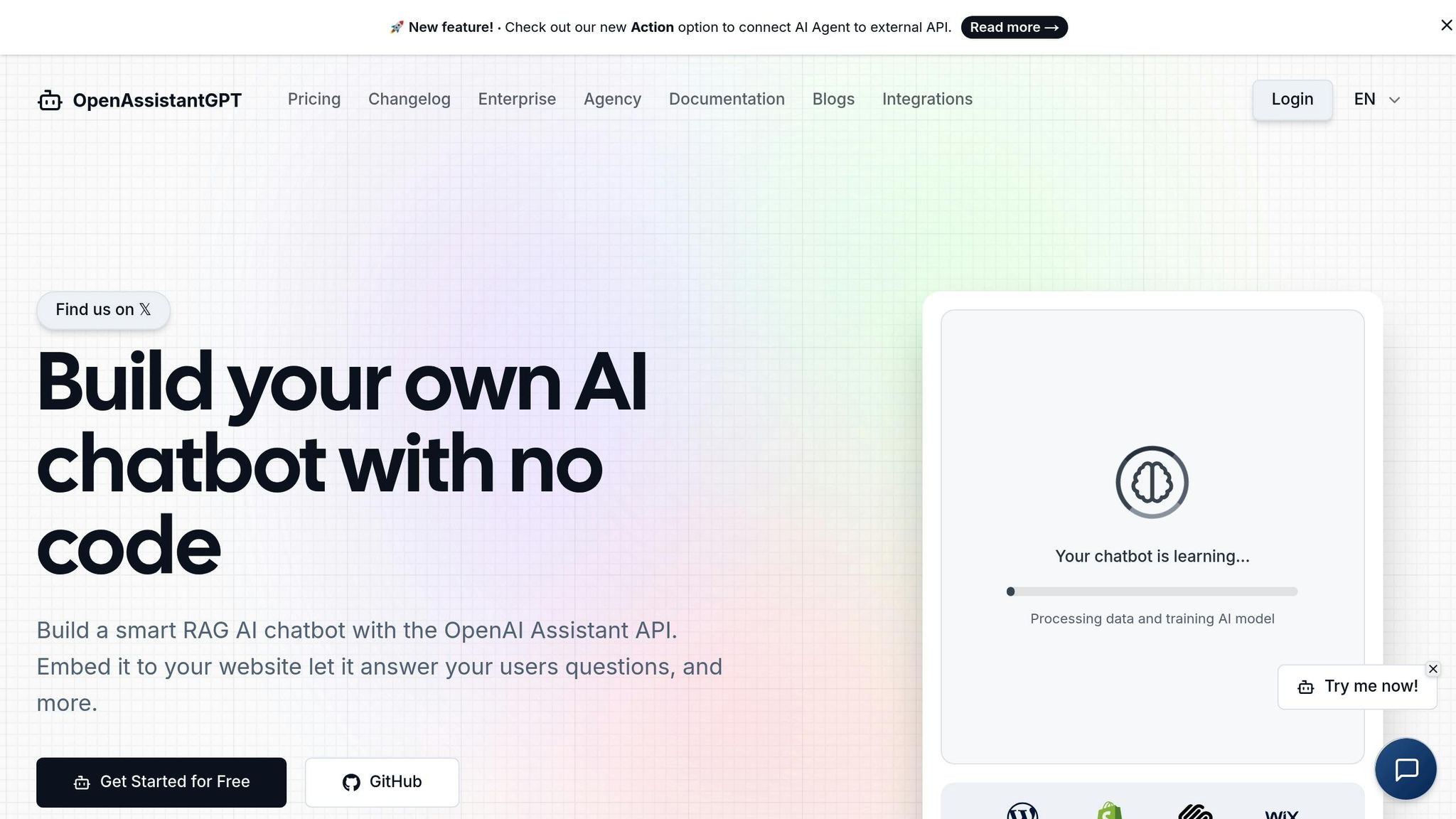
OpenAssistantGPT is a no-code platform designed to help anyone create sophisticated chatbots without needing technical expertise. With over 4,000 users already on board, it’s a trusted option for businesses looking for AI-driven customer service solutions that are simple to implement and manage.
By utilizing Retrieval-Augmented Generation (RAG) alongside OpenAI's Assistant API, OpenAssistantGPT enables chatbots to pull precise business data for accurate and helpful responses. Businesses using the platform have reported impressive results, including a 35% drop in support tickets, a 60% faster resolution time, and annual savings of up to $25,000.
Natural Language Understanding and AI Model Support
OpenAssistantGPT supports cutting-edge AI models like GPT-4, GPT-3.5, and GPT-4o, offering exceptional natural language processing capabilities. The platform includes features such as real-time web search, file analysis, and the ability to query API endpoints. You can train your chatbot using your website's content, and it supports various file types, including CSV, XML, and even images.
Integration with Third-Party Tools and Platforms
The platform integrates effortlessly with other no-code tools, making it easy to embed chatbots on your website without writing a single line of code. These integrations allow customer interactions to automatically trigger actions within systems like CRMs, email marketing platforms, or support tools, streamlining operations and saving time.
Customization and Scalability for Business Needs
OpenAssistantGPT is built to adapt to a wide range of business requirements. It offers features like lead collection via user inquiries and secure access through SAML/SSO authentication, which are particularly useful for sales and marketing teams. Whether you’re running a small operation or managing enterprise-level deployments, the platform scales seamlessly. Advanced users can also leverage its open-source SDK to integrate with frameworks like NextJS and Vercel, giving them even greater flexibility and control.
Pricing and Value for US-Based Users
OpenAssistantGPT offers straightforward pricing tailored to various needs, with plans that grow alongside your business:
| Plan | Monthly Price | Chatbots | Key Features | Best For |
|---|---|---|---|---|
| Free | $0 | 1 | 500 messages, basic features | Personal projects, testing |
| Basic | $18 | 9 | Unlimited messages, lead collection | Small businesses |
| Pro | $54 | 27 | Custom domains, no branding | Growing companies |
| Enterprise | Custom | Unlimited | SAML/SSO, SLA guarantee | Large organizations |
The Free Plan allows you to test the waters with one chatbot and up to 500 monthly messages. For $18/month, the Basic Plan supports nine chatbots, unlimited messages, and lead collection - perfect for small businesses. The Pro Plan, priced at $54/month, removes branding and enables custom domains, making it ideal for growing companies. For large-scale operations, the Enterprise Plan offers custom pricing, unlimited resources, and advanced security features like SAML/SSO and SLA guarantees.
2. ChatGPT by OpenAI
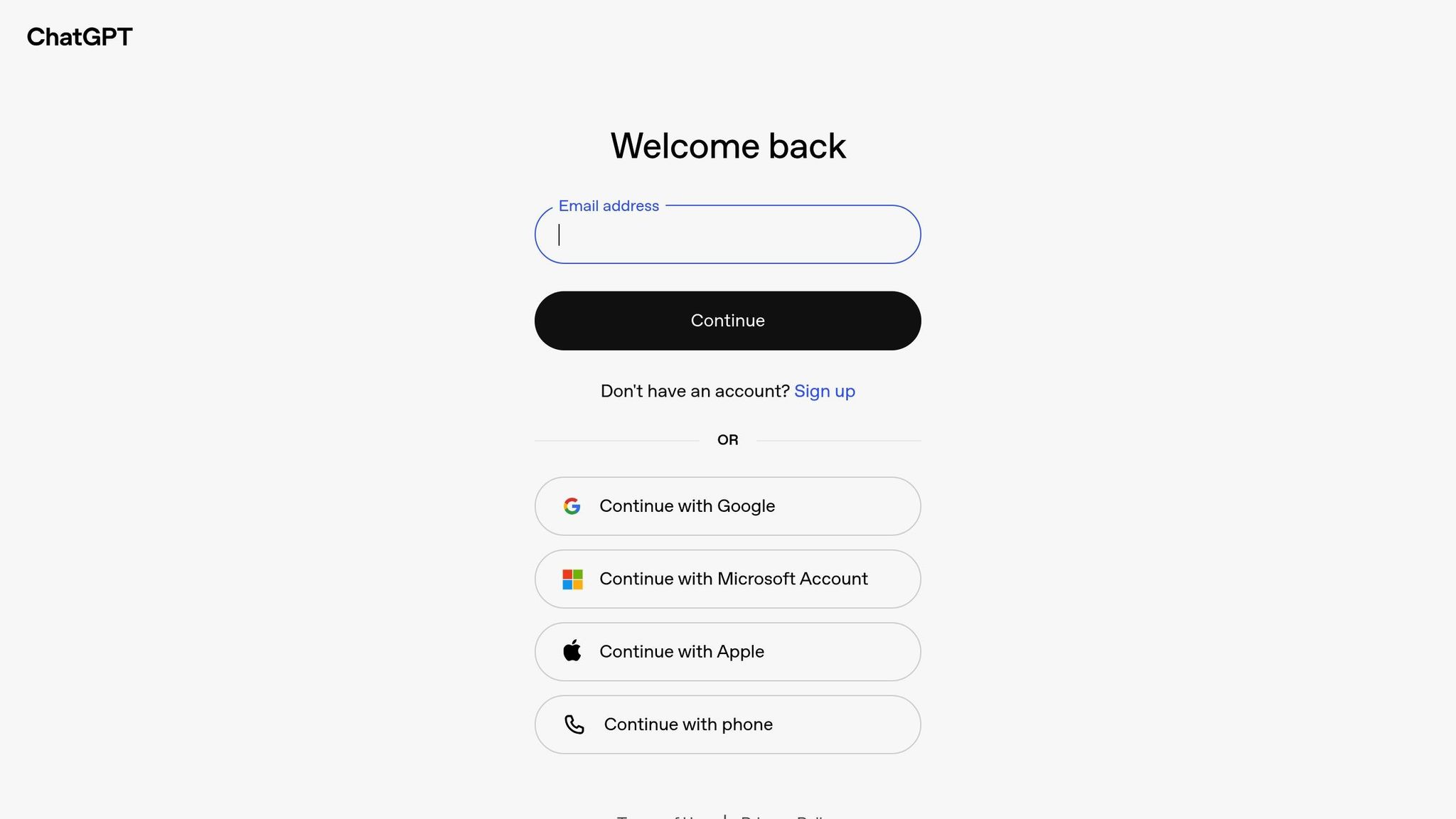
ChatGPT by OpenAI is one of the most prominent AI chatbot platforms, powered by advanced language models that have redefined how individuals and businesses engage with artificial intelligence. Since its launch, the platform has introduced significant improvements, offering more sophisticated conversational features.
Natural Language Understanding and AI Model Advancements
ChatGPT relies on OpenAI's state-of-the-art language models, with GPT-4.5 being the latest in their lineup. OpenAI describes it as, "our largest and best model for chat yet". This version builds on earlier iterations by improving unsupervised learning techniques, leading to better pattern recognition and the ability to generate creative insights. With its nuanced understanding of subtle context, GPT-4.5 delivers more natural and context-aware conversations.
Looking ahead, OpenAI plans to launch GPT‑5, which will incorporate features like voice, canvas, search, and research tools, promising even broader functionality. These developments aim to make ChatGPT a versatile tool for seamless integration into various business applications.
Integration with Third-Party Tools and Platforms
ChatGPT has significantly expanded its integration capabilities through its connector system, replacing the older plugin framework. These connectors enable secure and efficient links to popular business tools such as Google Drive, GitHub, Microsoft SharePoint, Box, and Dropbox.
For instance, the HubSpot connector allows users to query CRM data directly while maintaining strict permission settings. ChatGPT now integrates with over 1,500 apps, enabling automation through platforms like Make and Zapier. These no-code tools make it easy for businesses to connect ChatGPT to their workflows, automating tasks without requiring technical expertise.
Tailored Solutions and Scalability for Businesses
ChatGPT offers a range of customizable plans designed to meet diverse business needs. Users on Pro, Team, Enterprise, and Education tiers can create custom connectors to link ChatGPT with proprietary systems and internal data sources. The Enterprise tier stands out for its scalability, offering features like enterprise-grade security, unlimited access to advanced models, and dedicated support for large-scale operations.
Pricing Options for US-Based Users
ChatGPT has structured its pricing to cater to a wide range of users, from individuals to large organizations:
| Plan | Monthly Price | Key Features | Best For |
|---|---|---|---|
| Free | $0 | GPT-4o mini access, limited capabilities | Casual users, testing |
| Plus | $20 | Faster AI, priority access, web browsing, voice modes | Individual professionals |
| Pro | $200 | Unlimited GPT-4o access, advanced voice, research previews | Developers, power users |
| Team | $25/user (annual) or $30/user (monthly) | Collaboration tools, admin controls, shared GPTs | Small to medium teams |
| Enterprise | Custom pricing | Enterprise security, unlimited access, dedicated support | Large organizations |
The Plus plan at $20 per month is ideal for individual professionals seeking faster responses and access to advanced features. Meanwhile, the Pro plan at $200 per month targets developers and heavy users who need unlimited access and the latest model previews. For teams, the Team plan offers collaborative tools and admin controls, costing $25 per user monthly with annual billing.
Nonprofit organizations can benefit from discounts, including a 20% reduction on Team plans ($20 per user per month for annual billing) and a 25% discount on Enterprise plans tailored for larger nonprofits.
3. Microsoft Azure Bot Service
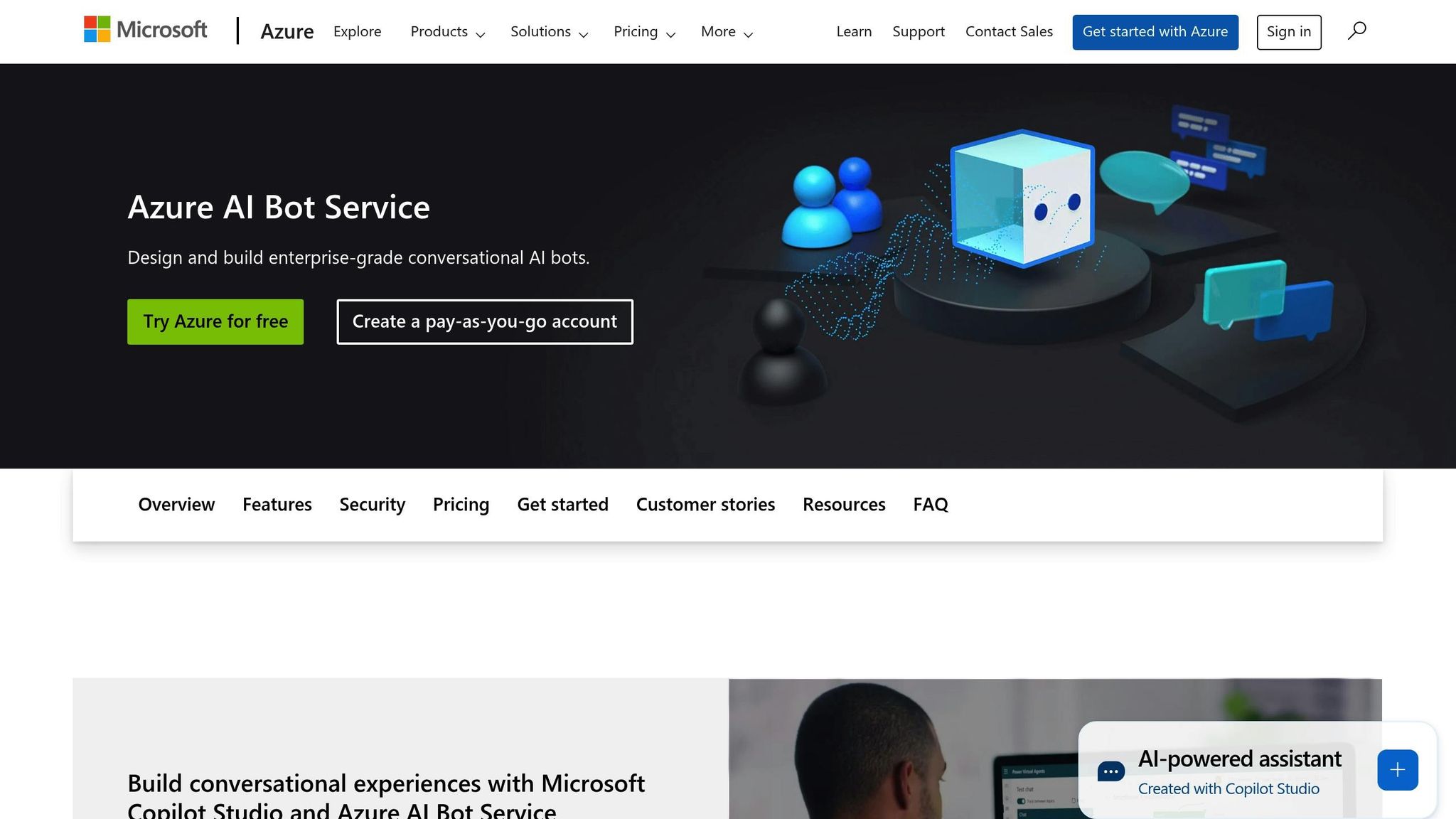
Microsoft Azure Bot Service is a cloud-based platform designed to deliver enterprise-level chatbot solutions within Microsoft’s ecosystem. Powered by Azure’s reliable infrastructure, this service equips businesses with the tools they need to create intelligent, scalable conversational experiences. Let’s dive into how its advanced language capabilities help chatbots understand user intent with precision.
Natural Language Understanding (NLU) and AI Model Support
Azure Bot Service integrates seamlessly with Azure Cognitive Services, including Language Understanding (LUIS), to develop chatbots capable of interpreting natural language. This allows bots to accurately identify user intent and extract relevant details from conversations. Developers can leverage the Bot Framework SDK to create highly advanced bots, while the Bot Framework Composer offers a visual, no-code option for designing conversational flows.
It’s important to note that LUIS will be retired after March 31, 2026, with new resource creation ending on August 1, 2025. Microsoft encourages users to migrate to its updated conversational language understanding tool.
Integration with Third-Party Tools and Platforms
The Azure Bot Service stands out for its ability to integrate with other tools, such as Microsoft Copilot Studio, a low-code platform that simplifies bot creation. The service also supports deployment across multiple channels - including websites, mobile apps, Facebook, and Microsoft Teams - ensuring businesses can reach their customers wherever they are.
Several real-world examples demonstrate its versatility. For instance, the Miami Dolphins used Microsoft tools to build a chatbot that handled 40,000 fan interactions, successfully resolving 97% of inquiries. Similarly, Vodafone utilized Azure AI Services and the Microsoft Bot Framework to provide instant customer support.
Progressive Insurance also found the platform intuitive. Matt White, Marketing Manager for Personal Lines Acquisition Experience at Progressive Insurance, shared:
"One of the great things about Bot Service is that, out of the box, we could use it to quickly put together the basic framework for our bot."
Customization and Scalability for Business Needs
Azure Bot Service is built on Azure’s cloud infrastructure, enabling it to manage increasing user interactions without compromising performance. With support for over 18 languages, it’s well-suited for businesses with a global audience. Companies can customize their chatbots extensively - whether by designing tailored conversation flows using adaptive or waterfall dialogs or by aligning the bot’s appearance with their brand through customizable colors, logos, and styles. Additionally, APIs can be integrated to ensure smooth data retrieval from internal systems.
| Features | Description |
|---|---|
| Scalability | Handles growing user interactions efficiently, thanks to Azure’s cloud infrastructure |
| Multi-Channel Support | Deploy bots across websites, mobile apps, social media, and messaging platforms |
| Custom Dialogs | Create personalized conversation flows using adaptive or waterfall dialog patterns |
| Branding | Customize bot appearance with company colors, logos, and styles |
| Multilingual Support | Supports over 18 languages via Azure Cognitive Services |
With its robust integration options and ability to scale effortlessly, Azure Bot Service is a powerful solution for businesses looking to enhance customer interactions.
sbb-itb-7a6b5a0
4. Tidio AI Chatbot
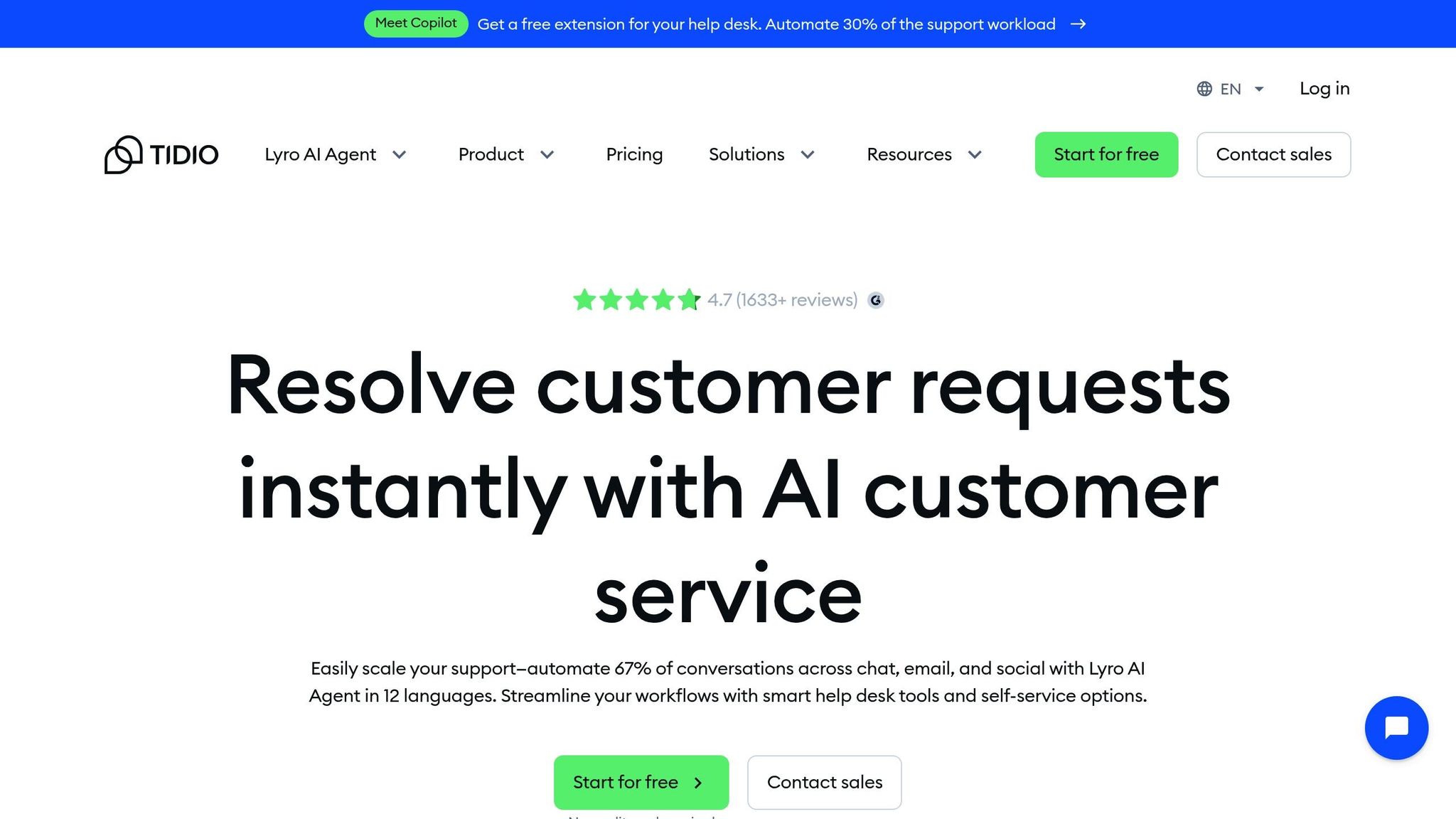
Tidio AI Chatbot is a versatile platform designed to automate customer support and boost sales conversions. Trusted by over 300,000 businesses, it features the Lyro AI Agent, which efficiently handles customer inquiries while integrating seamlessly into existing workflows.
Natural Language Understanding (NLU) and AI Model Support
Tidio's Lyro AI Agent enhances support automation by leveraging Natural Language Processing (NLP) to interpret customer queries and respond in real time. With its AI Phrase Matcher, the chatbot connects diverse customer questions to predefined phrases, enabling accurate and context-aware responses. This allows for more natural, human-like conversations that go beyond basic keyword matching.
The platform’s real-world performance highlights its effectiveness. For instance, Jiffy, a leading US retailer specializing in blank apparel and custom transfers, successfully automated 68% of its customer queries using Lyro AI Chatbot. This significantly reduced the workload for their support team.
Max Sealey, Support Services Manager at Gecko Hospitality, shared his insights:
About 90% of conversations are handled by Lyro with near-perfect responses.
Integration with Third-Party Tools and Platforms
Tidio integrates with over 120 tools, making it easy for businesses to streamline operations. It connects with e-commerce platforms, marketing tools, CRM systems, and social media channels, ensuring businesses can retain their existing workflows while adding AI-powered chat capabilities. Additionally, its integration with Zapier enables custom solutions, such as connecting to ChatGPT (OpenAI) for tasks like conversation summarization, sentiment analysis, and customer inquiry insights. These integrations allow businesses to create tailored solutions that grow alongside their needs.
Customization and Scalability for Business Needs
Tidio offers extensive customization options to align with your brand’s identity. Businesses can personalize the chat widget’s appearance - adjusting colors, logos, and welcome messages - to create a consistent brand experience. Features like conversation starters and visibility settings further enhance visitor engagement. The platform also supports multilingual interactions and complies with GDPR and CCPA regulations, ensuring data security. Its analytics tools provide insights into the Lyro AI Agent’s performance, helping businesses refine their workflows and achieve cost-efficiency.
Several companies have seen impressive results with Tidio's customization and scalability. For example, Eye-oo, a multi-brand retailer, used cart abandonment recovery bots to increase sales by 25% and achieve a fivefold boost in conversions, resulting in $177,000 in additional revenue. They also reduced customer wait times from 2–5 minutes to just 30 seconds. Similarly, Endeksa, a real estate data analytics platform operating in Turkey, Spain, and Portugal, leveraged Tidio’s NLP chatbots to cut response times by 59%, boost lead generation by 138%, and improve customer satisfaction by 10%.
Roberto Coindreau, CEO at Integratec, highlighted the platform’s impact:
Our sales team experienced a 25% increase in qualified leads from our website chat.
Pricing and Value for US-Based Users
Tidio provides a free plan with basic features, making it an excellent option for small businesses and startups. For more advanced tools, such as the Lyro AI Agent and additional integrations, premium plans are available, offering scalable pricing based on usage and features. The platform has received high user ratings, with a 4.7/5 overall score and a 4.8/5 rating on the App Store. Users often praise its ease of use, customization options, and responsive customer support, though some have noted concerns about upselling tactics in the free plan.
With its advanced NLP features, integration capabilities, and proven success across industries, Tidio AI Chatbot provides US businesses with a powerful solution for automating customer support while maintaining high-quality interactions.
5. ManyChat
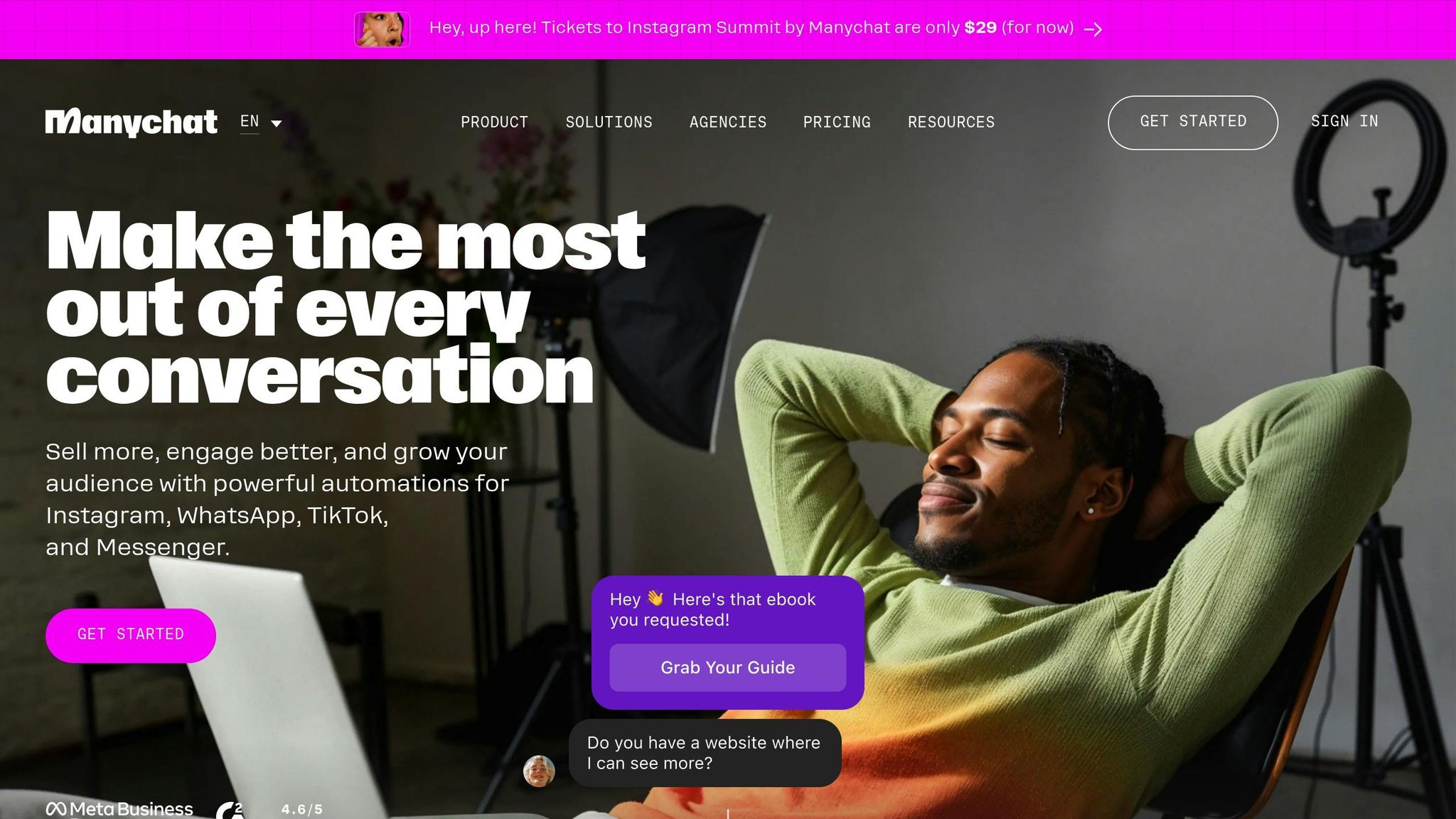
ManyChat is a messenger marketing platform designed to automate conversations on Facebook Messenger, Instagram, and WhatsApp. By focusing on messaging channels, ManyChat aims to achieve higher engagement rates compared to traditional email marketing. Let’s dive into ManyChat’s AI capabilities and other features.
Natural Language Understanding (NLU) and AI Model Support
ManyChat uses advanced AI to understand user intent, delivering accurate responses without depending on specific keywords. This capability allows the platform to handle inquiries in major languages and manage diverse questions without manual input.
The platform also includes an AI Step feature, which leverages artificial intelligence to handle complex interactions. Businesses can set specific goals - like gathering customer data or delivering personalized responses - by providing scripts and instructions. The AI Step adapts to company-specific details, such as product information, FAQs, tone of voice, and language preferences. Additionally, ManyChat’s integration of AI into existing automations enables businesses to fine-tune chat flows and create more personalized experiences. This feature is available with the Pro plan.
Integration with Third-Party Tools and Platforms
ManyChat extends its functionality by integrating with external tools via platforms like Zapier and Albato. These integrations connect ManyChat to various applications in marketing automation, e-commerce, CRM, and communication. For instance, businesses can link ManyChat with ActiveCampaign using Albato to trigger customized engagement flows automatically.
The platform’s effectiveness is highlighted by its performance metrics: messenger bots can achieve a 56% click-through rate, compared to the 1–2% typically seen with email campaigns. Mikael Yang, CEO of ManyChat, underscores this potential:
"Imagine achieving an 80% open rate for your marketing messages."
Customization and Scalability for Business Needs
ManyChat offers extensive customization options, ensuring seamless brand alignment across channels like Facebook Messenger, WhatsApp, and Instagram DMs. Its flexible pricing model, based on the number of contacts, allows businesses to scale as they grow. The AI Step feature further enhances customization, enabling businesses to reflect their unique brand voice, product expertise, and customer service standards.
Pricing and Value for US-Based Users
ManyChat’s pricing is structured to accommodate businesses of all sizes. The Free plan supports up to 1,000 contacts at no cost, while the Pro plan starts at $15 per month for up to 500 contacts. Pricing adjusts as the contact list grows:
| Contact Range | Monthly Price | Price per 1,000 Contacts |
|---|---|---|
| Up to 500 | $15 | $30.00 |
| Up to 2,500 | $25 | $10.00 |
| Up to 5,000 | $45 | $9.00 |
| Up to 10,000 | $65 | $6.50 |
| Up to 50,000 | $235 | $4.70 |
| Up to 100,000 | $435 | $4.35 |
For larger enterprises, ManyChat offers a custom Elite plan with pricing tailored to specific needs. Keep in mind that SMS, email usage, and WhatsApp conversations are billed separately from the Pro plan. Additional charges per message vary depending on the country code for WhatsApp contacts.
Feature and Price Comparison
This section breaks down key features and pricing to help you decide which chatbot aligns best with your needs.
When selecting an AI chatbot platform, it's essential to match its features, pricing, and capabilities to your specific goals. The platforms reviewed here range from all-in-one business tools to more focused automation solutions.
OpenAssistantGPT is notable for its no-code design and flexible pricing. It starts with a free plan, which includes 1 chatbot and 500 messages per month - perfect for testing. The Basic plan ($18/month) offers 9 chatbots with unlimited messages, while the Pro plan ($54/month) supports 27 chatbots and adds advanced features like custom domains and file attachments. For enterprise users needing unlimited resources and SAML/SSO authentication, custom pricing is available.
ChatGPT by OpenAI provides advanced AI capabilities but starts at a minimum $20/month subscription for premium features.
Microsoft Azure Bot Service caters to enterprise users with pricing starting at $5.00/month, making it a great option for those already using Microsoft tools.
Tidio AI Chatbot focuses on e-commerce applications, with plans starting at $25/month and a 7-day free trial for new users.
ManyChat is designed for social media marketing, offering its Pro plan starting at $15/month, which is ideal for messenger-based campaigns.
| Platform | Starting Price | Core Advantage | Best For |
|---|---|---|---|
| OpenAssistantGPT | Free (then $18/month) | No-code customization with a free plan | Website integration |
| ChatGPT | $20/month | Advanced AI capabilities | General-purpose use |
| Azure Bot Service | $5/month | Enterprise infrastructure | Microsoft ecosystem users |
| Tidio | $25/month | E-commerce-specific features | Online retailers |
| ManyChat | $15/month | Social media-focused integration | Messenger marketing |
Pricing insights: OpenAssistantGPT stands out with its free plan, offering an affordable way to test its features. Meanwhile, ChatGPT and Azure Bot Service rely on subscription-based models for premium access, and Tidio targets e-commerce businesses with tailored solutions.
For context, businesses in the U.S. typically spend $30–$150 per month on chatbots for small to medium operations, $800–$1,200 for mid-market needs, and $3,000–$10,000+ for enterprise-level solutions.
Return on Investment (ROI): Chatbots can deliver real savings and efficiency. Studies show they handle 70% of routine customer support queries and save up to $0.07 per interaction. Plus, while traditional websites convert about 5% of visitors into leads, chatbots can boost this rate to 9–10%.
If you're looking for an accessible starting point, OpenAssistantGPT's free plan and no-code setup make it an excellent choice for enhancing your website with AI-driven conversations.
Final Thoughts
Choosing the right AI chatbot platform comes down to aligning your business goals, required features, and budget. Businesses that take the time to thoroughly evaluate their options before implementation often see the highest returns. In fact, data shows that chatbot systems with robust integrations can deliver up to three times the ROI compared to standalone setups. A detailed evaluation process ensures you select a solution that not only fits your current needs but can also grow with your business.
Testing plays a critical role in this decision. Free trials and basic plans are excellent tools for assessing response accuracy, understanding how the chatbot interprets varied user inputs, and evaluating its overall performance before making a financial commitment. For instance, OpenAssistantGPT offers a free plan that includes one chatbot and up to 500 messages per month. This allows businesses to explore its no-code setup and website integration features without risk.
When comparing platforms, focus on how well they integrate with your existing systems, like your CRM or customer service software. Consider deployment speed and whether the chatbot can handle the complexities of your products or services. Austin Towns, Chief Technology Officer at Hello Sugar, highlighted how automation helped his company scale:
"We currently have 81 salons and are going to grow to 160 this year – without growing our reception staff. And with automation, we're able to do that while offering way better CX and getting higher reviews".
It's also vital to consider the total cost of ownership - this includes not just subscription fees but also integration, training, and maintenance costs. Businesses that actively optimize their chatbots using data-driven strategies often see a 30–40% performance boost compared to static implementations.
The AI chatbot industry is evolving fast. By 2025, chatbots are expected to handle up to 95% of customer interactions. Adopting a solution like OpenAssistantGPT, which is scalable and integrates seamlessly with your existing tools, positions your organization for long-term success while delivering measurable results today.
Make the most of free trials, involve your team and customers in the testing process, and remember: the best chatbot is the one that gets implemented effectively and becomes an integral part of your business operations.
FAQs
How does OpenAssistantGPT enhance customer service and help businesses save money?
AI chatbots, like OpenAssistantGPT, are reshaping customer service by handling up to 80% of routine inquiries. This efficiency can lead to businesses cutting support costs by as much as 30%. Plus, these chatbots never take a day off - they’re available 24/7, ensuring consistent support during holidays or after regular business hours. By taking over repetitive tasks, they allow human agents to dedicate their time to more complex issues, boosting both efficiency and customer satisfaction.
On top of that, OpenAssistantGPT helps businesses cut operational costs by simplifying workflows and reducing the need for large support teams. The result? Faster, higher-quality responses that not only improve the customer experience but also make better use of available resources.
What features make OpenAssistantGPT ideal for businesses of all sizes?
OpenAssistantGPT comes packed with features tailored to support businesses of all sizes, from budding startups to established enterprises. Among its highlights are customizable chatbots that can be tailored to specific needs, SAML/SSO authentication for secure user access, SLA guarantees to ensure reliability, and advanced web crawling tools for enhanced functionality.
Built on an open-source framework, it offers the flexibility to scale as your business grows. Deployment is straightforward, thanks to its seamless integration options. Plus, it includes enterprise-grade security measures and management tools, ensuring robust data protection and consistent performance across various business environments.
How does OpenAssistantGPT's integration capability benefit businesses?
OpenAssistantGPT makes it easy for businesses to connect with their existing tools and platforms. This integration streamlines automation for tasks like customer service and repetitive workflows, helping save both time and resources.
On top of that, businesses can build custom extensions tailored to their specific needs. These extensions allow for personalized customer interactions on a large scale, improving day-to-day operations while expanding the scope of AI-powered solutions with minimal hassle.